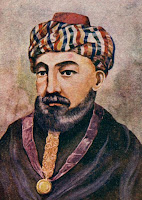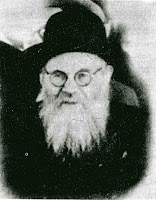What does it mean to be a Jew?
When I describe myself as a Jew, what does that really mean?
It is readily apparent that none
of the normal categories for group identification (e.g. ethnicity, race,
nationality) really fit the Jewish people. It might be tempting to define a
“Jew” as an adherent to the religion known as “Judaism”, but, while religion is
certainly an important aspect of Jewish identity, such a definition doesn’t
really work either.
This question is not simply
theoretical. A Jew has an obligation to identify with the Jewish people. As we have discussed previously, the Sages tell us that there were "wicked" and
"sinful" Jews who died during the plague of darkness. What was so wicked and
sinful about these Jews? We are told only this: That they were comfortable in Egypt
and did not wish to leave. Their sin was that they had separated themselves
from the community, and did not see themselves as an inseparable part of the
Jewish people.
This raises an obvious and
critical question. What does it actually mean, in practical terms, to be part
of the Jewish people? As we see from the fate of these Egyptian Jews, a large
part of it is that we are required to identify with other Jews and to see our
fates as inextricably intertwined, so that what is "good for the Jews" is good
for us, and what is "bad for the Jews" is bad for us. Thus, Chazal teach us, "אל תפרוש מן הצבור" - "Do not separate from the
community,” which means that when the community is suffering, you
have an obligation to bear the burden and suffer together with the community,
even if the problem does not directly affect you.
Indeed, we are taught that one who separates from the community when it is
suffering will not merit to see the community's deliverance.
However, while it is clear that a
Jew is obligated to identify with the Jewish people, and to bear the burdens of
the community, this alone does not really answer our question. After all,
people can disagree on what is and what is not "good for the Jews." We can be
sure that many of the Jews that wished to remain in Egypt
honestly believed that remaining in Egypt was "good for the Jews."
Instead of just giving up on Egypt,
they believed that the Jewish people should be using the opportunity provided
by the plagues to fight for full civil rights as Egyptian citizens. To these
people, remaining in Egypt – the center of civilization – was "good for the Jews", while running off to
conquer some insignificant backwater was obviously "bad for the Jews."
Even if we think they were wrong,
why did simply having this opinion make them "wicked" and "sinful"? These Jews
didn't see themselves as turning their back on their people. On the contrary,
they sincerely believed that their approach was in the best interests of the
Jewish people. What made their opinion so invalid that not only was it wrong,
but it essentially cut them off from the Jewish nation?
The root of the problem was that Moses,
the prophet of God, had made it very clear that the God wanted the Jewish
people out of Egypt. That should have been the end of the debate. If God wants us out, then clearly
that is what is "good for the Jews." So, regardless of their intent, their
opinion was one that was in conflict with God’s vision of the purpose of the
Jewish people.
Identifying with the Jewish
people cannot be separated from the recognition that the Jewish people are the
chosen people of God to whom He has revealed His intent through His Torah and
His prophets. The Jewish people are not a nation like other nations; rather we
are a "kingdom of priests and a holy nation." We are the "children of God", His
"first-born son", and any identification with the Jewish people that fails to
include these factors is as false as it would be for a brother to insist on his
familial relationship with his siblings while denying his connection to their
father.
Rav Saadia Gaon famously wrote (Emunos v’Deos 3:7),
אומותינו איננה אומה כי אם בתורותיה – “Our nation is only
a nation through its Torah.” The Torah is what truly binds us together and it
is the reason for our existence as a nation. We express this recognition every morning when we recite the Birchos HaTorah (Blessings on the Torah) in which we declare:
ברוך אתה ה' אלקינו מלך העולם אשר בחר בנו מכל
העמים ונתן לנו את תורתו. ברוך אתה ה' נותן התורה
Blessed are You, Hashem, our God, King of the universe, Who chose us from among all the nations and gave us His Torah. Blessed are You, Hashem, Who gives the Torah.
R’ Samson Raphael Hirsch explains (Siddur, p.9):
From the very beginning, His purpose in electing us was to give us His Torah, to make us its bearers, students, and executors (Exodus 3:12). Our entire historical significance among the nations stands and falls by the manner in which we cultivate and cherish the Torah in our midst. Should we ever cease to know the Torah, or to fulfill it, we should also cease to have a place among mankind.
The Torah is the core of all true
Jewish identity. To truly identify as a Jew means to recognize the Torah as the
purpose of our existence and, as in R’ Hirsch’s words, to "cultivate and cherish the
Torah in our midst." It is this that is the true measure of one’s identity as a
Jew.
דער ריכטיגער באַראָמעטער אין אידישקייט,
וויפיעל גראַד אידישקייט יעדער האָט, זאָל באַטראַכטען ווי איז זיין באַציהונג צו
תורה: צו ער לערענט אַליין, צו ער גיט זיינע קינדער צום לערנען, און צו ער איז
מחזיק תורה.
The true barometer of Judaism with which to measure a person’s level of Jewishness is a person’s relationship with the Torah: Does he study Torah himself? Does he send his children to study? And does he support Torah study?
To identify as a Jew requires
much more than simply the mere assertion of such an identity, no matter how strongly
felt. It requires a genuine commitment to what the Jewish nation actually is:
God’s kingdom of priests, who heard the voice of God at Mt. Sinai and received His Torah.




